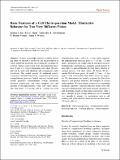Basic Features of a Cell Electroporation Model: Illustrative Behavior for Two Very Different Pulses
Author(s)
Son, Reuben S.; Smith, Kyle C.; Gowrishankar, Thiruvallur R.; Vernier, P. Thomas; Weaver, James C.
DownloadGowri_Basic Features author-corrected.pdf (1.848Mb)
PUBLISHER_CC
Publisher with Creative Commons License
Creative Commons Attribution
Terms of use
Metadata
Show full item recordAbstract
Science increasingly involves complex modeling. Here we describe a model for cell electroporation in which membrane properties are dynamically modified by poration. Spatial scales range from cell membrane thickness (5 nm) to a typical mammalian cell radius (10 μm), and can be used with idealized and experimental pulse waveforms. The model consists of traditional passive components and additional active components representing nonequilibrium processes. Model responses include measurable quantities: transmembrane voltage, membrane electrical conductance, and solute transport rates and amounts for the representative “long” and “short” pulses. The long pulse—1.5 kV/cm, 100 μs—evolves two pore subpopulations with a valley at ~5 nm, which separates the subpopulations that have peaks at ~1.5 and ~12 nm radius. Such pulses are widely used in biological research, biotechnology, and medicine, including cancer therapy by drug delivery and nonthermal physical tumor ablation by causing necrosis. The short pulse—40 kV/cm, 10 ns—creates 80-fold more pores, all small (<3 nm; ~1 nm peak). These nanosecond pulses ablate tumors by apoptosis. We demonstrate the model’s responses by illustrative electrical and poration behavior, and transport of calcein and propidium. We then identify extensions for expanding modeling capability. Structure-function results from MD can allow extrapolations that bring response specificity to cell membranes based on their lipid composition. After a pulse, changes in pore energy landscape can be included over seconds to minutes, by mechanisms such as cell swelling and pulse-induced chemical reactions that slowly alter pore behavior.
Description
This is an author-corrected version of the final published paper.
Date issued
2014-07Department
Institute for Medical Engineering and Science; Harvard University--MIT Division of Health Sciences and TechnologyJournal
The Journal of Membrane Biology
Publisher
Springer-Verlag
Citation
Son, Reuben S., Kyle C. Smith, Thiruvallur R. Gowrishankar, P. Thomas Vernier, and James C. Weaver. “Basic Features of a Cell Electroporation Model: Illustrative Behavior for Two Very Different Pulses.” J Membrane Biol 247, no. 12 (July 22, 2014): 1209–1228. © 2014 Springer Science+Business Media New York
Version: Final published version
ISSN
0022-2631
1432-1424